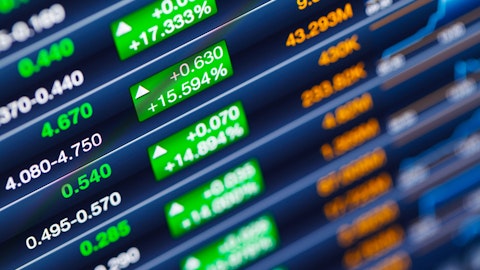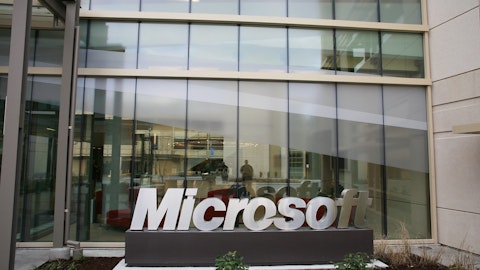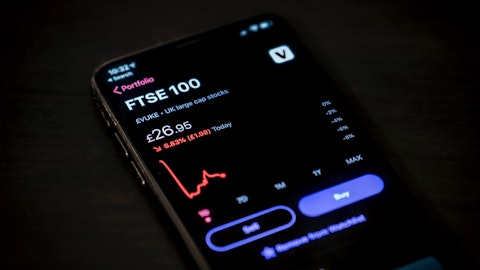1. Alibaba Group Holding Limited (NYSE: BABA)
Number of Hedge Fund Holders: 146
Topping the list of 10 best international stocks in 2021 is China-based multinational technology company Alibaba Group Holding Limited (NYSE: BABA).
On September 11th, KGI Securities initiated coverage on Alibaba Group Holding Limited (NYSE: BABA) with a Neutral rating and a HK$205 per share price target.
The company has a market cap of $441.13 billion. In the first quarter of 2022, Alibaba Group Holding Limited (NYSE: BABA) reported an EPS of $2.57, beating estimates by $0.35. The company’s first-quarter fiscal 2022 revenue came in at $31.8 billion, up 34% year-over-year.
Tweedy, Browne Company LLC, mentioned Alibaba Group Holding Limited (NYSE: BABA) in its Q2 2021 investor letter:
“A position that we established around year-end, and have added to across three of our Funds during the quarter, is Alibaba, the Chinese internet giant. Our pricing opportunity in these shares is in part related to increased regulatory scrutiny of the internet sector by the Chinese government which we continue to monitor closely.
Alibaba is the largest e-commerce company in China, with over 50% market share in terms of gross merchandise value. We first purchased Alibaba for the Funds around calendar year-end. Its core consumer marketplace businesses consist of Taobao (China’s largest consumer-to-consumer online shopping destination) and Tmall (China’s largest third-party platform for brands and retailers). Additionally, Alibaba operates the dominant cloud platform in China (AliCloud), international e-commerce operations (Lazada, etc.), and digital media services, and has several strategic investments, including a 33% stake in Ant Financial.
Alibaba’s share price weakened significantly in Q4 2020 due to increasing regulatory scrutiny, including a pulled IPO of Ant Group that was originally set for November, 2020. In November, the State Administration of Market Regulation (SAMR) unveiled draft amendments to China’s Anti-Monopoly Law that extended the law to internet platforms, prohibiting practices such as platform exclusivity, predatory pricing, and price discrimination based on user data, among others. SAMR also initiated an official antitrust investigation into Alibaba and Ant Group in December. At time of purchase, we thought the SAMR investigation into Alibaba’s core e-commerce business would have a somewhat limited impact, as many merchants are already on multiple platforms, but are attracted to Alibaba because of its strong ecosystem, traffic and marketing efficiency. There are network effects associated with a very large user and merchant base. The large Alibaba ecosystem (including local services, payments, etc.) also allows data integration across various scenarios to enable more targeted solutions to merchants and customers. Alibaba’s core marketplace business is a strong cash generator. We believe it should continue to grow with the e-commerce sector, driven by growing consumption in China and penetration into newer categories.
Alibaba also has continued to invest significantly in newer initiatives, such as Taobao Deals and Taobao Grocery, to extend the growth runway of the company.
In April 2021, the SAMR announced a $2.75bn fine on Alibaba for its violations of the Anti-Monopoly Law, putting an end to the bulk of the regulatory review and overhang. The fine equated to 4% of revenue and a minor portion of Alibaba’s net cash ($51bn as of December 31, 2020). Management does not expect any material impact on its business from the change in exclusivity arrangement imposed by regulators. Ant Financial could face greater regulatory impacts, but it is a relatively small part of our total valuation of Alibaba, so the downside is limited in our view. At time of purchase, Alibaba sold for less than 12x its estimated core “marketplace” EBITA, after deducting values for its other assets (i.e., international commerce, cloud, and new media) from Enterprise Value. We valued the company’s cloud business using an operating margin similar to Amazon Web Services (AWS) and a 15x operating multiple. While the cloud business just turned marginally profitable last quarter, Alibaba is a significant leader in the industry (≈40% market share) and has first-mover advantages. As can be seen from AWS, cloud is an industry with strong economies of scale and high switching costs. China’s cloud industry is less mature than in the U.S., and Alibaba has been investing significantly to grow scale (AliCloud grew revenue over 50% in 2020), and in the longer-term we are optimistic that its operating margin can reach AWS levels. Alibaba’s management recently provided financial guidance indicating that all of the company’s incremental operating profit this year (fiscal 2022) would be reinvested into new initiatives. As a result, the company’s operating profit will be relatively flat this year. We do not believe this changes the long-term earnings growth rate or value of the business.
In addition to Alibaba, our Funds own interests in several additional Chinese companies including Dali Foods, a snack foods company; A-Living, a property management business; Baidu, which has at times been referred to as the Chinese Google; Shanghai Mechanical and Electrical, which markets and manufactures elevators; and several Hong Kong based businesses. All of these additional investments, including Alibaba, constitute approximately 8% of the total assets of the International Value Fund. First and foremost, all of these investments were made at prices that were at substantial discounts from our estimates of intrinsic value, and the underlying businesses, in our view, have the potential for higher return profiles than many of our other investments. Secondly, economic growth rates in China and other parts of the Far East significantly exceed those of most Western economies. China is currently the second largest economy in the world, and may become the largest economy in the not-too-distant future. Thirdly, while the Chinese government has more recently increased its regulatory oversight of a number of industries, in part to achieve broad social objectives, we do not believe these actions will ultimately impair the efficacy and value of the investments we have made. We will continue to manage our risk by exercising extreme price sensitivity when making purchases, diversifying our exposure, focusing our attention on businesses that are not in the “cross hairs” of the Chinese government, and by limiting our overall portfolio allocation to no more than 10% of total portfolio assets at cost. As an aside, we were also encouraged to see that the Daily Journal, a company whose Chairman is Charlie Munger, recently established a meaningful position in Alibaba.”
You can also take a peek at the 15 Most Valuable Gaming Companies in the World and 10 Best European Bank Stocks to Buy Now





